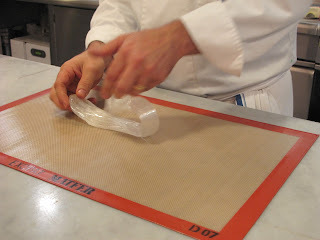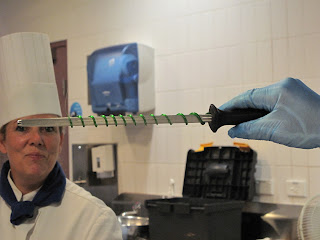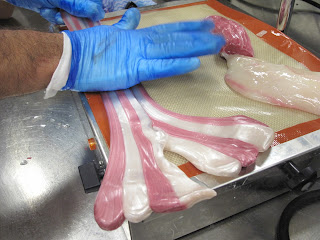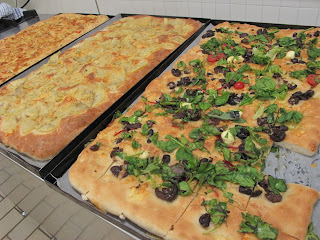
Chef Luigi's Deep Sea Sugarwork
This is a particularly hard post for me to do, being the final write up of my LCB experience, which only partially exonerates my procrastination in uploading this more than 3 6 9 10 months after the fact. It was a bittersweet lesson, making sweet sugarwork on our last day of school. But it must be done and proceed we shall.


Blown Sugar Swan & Satiny Rose
Behold the above objectives of the day: impressive and intimidating-looking swans and roses. Fingers crossed I will be producing more than just burnt fingers by the end of class.

Raw Isomalt
All sugar sculptures begin life as Isomalt, a naturally occurring sugar alcohol derived from beets (nasty stuff if you ask me), often used by diabetics for their low calorie count and minimal impact on the blood sugar level. Calorific concerns aside (don't even get me started on the after effects such as flatulence and diarrheah), it is isomalt's unique malleable property which makes it more suitable for sugar work than pure sugar per se.


Boiling Colored Isomalt To 170°C - 180°C
Arresting In Ice Water To Halt Cooking Process
To get isomalt into working condition it is first melted down over very high heat, a process during which one's color of choice may be added for the desired result. The first showpiece being that of aquatic life, seaweed green and oceanic blue are applied.


"Corals" Cast In Alcohol
"Bubbles" Cast On Crumpled Greaseproof Paper
"Casting" isomalt simply means pouring it into a beaker of alcohol or onto greaseproof paper to set. In contact with the former, a chemical reaction results in gas bubbles erupting in the setting isomalt, and a coral effect is thus achieved. On the latter, a flat sheet emerges which can then be used as a base, backdrop or indeed any part of a showpiece as you see fit.
Smooth & Motif-ed

Isomalt Cast In Raw Isomalt

Melting & Fusing Isomalt Pieces Together
The ends of each piece are dipped into a pot of still hot-as-hell molten isomalt to melt before being fused together.
With the deep sea set complete, Chef Luigi proceeds to create a fish out of blown sugar, a common sugar work process also employed in the making of our beautiful swan.


Pulling (Hot!) Isomalt For Aeration, Elasticity & Sheen
Once the isomalt has been brought to temper and cast, the pulling process begins. This must be done while the isomalt is still hellishly hot and pliable, pulled and pulled again over and into itself, trapping precious air bubbles in the process. It is this progressive build up of tiny air bubbles which gives the worked isomalt its opaque, glossy sheen and improved elasticity, a prized quality in the sugar-blowing process.


Heating Sugar Pump For An Airtight Adherence To Isomalt
Pulling The End To Form The Swan's Head & Neck
A special pump is heated and fused airtight to one end of the pulled isomalt, to ensure when pumped, no air escapes and an even expansion occurs within. Next, one end of the isomalt is carefully pulled and stretched to form the neck of the swan.
Then the blowing commences. This is a controlled process, much as size and ego go, as blowing the body up too much will eventually crack the isomalt and the process will have to be repeated again.
Then the blowing commences. This is a controlled process, much as size and ego go, as blowing the body up too much will eventually crack the isomalt and the process will have to be repeated again.


Pumping (& Plumping) Up The Body
Cooling Down To Set


"Feathers" Made By Casting Pulled Isomalt In Leaf Molds
Fusing On Wing & Tail "Feathers"
Let's see the entire process in slow motion, shall we?


Chef Karen Pulling Isomalt
With Her Pair Of Handy Dandy Dish Washing Gloves!


The "La Mien" Technique For Better Aeration & Sheen


Spray Painting Blown Isomalt Fish
Pulled Isomalt Coils
Once the pulled and blown isomalt has been worked into shape and enhanced with features such as feathers and tails, the finishing touches are added; in the case of our aquatic friend, it is spray painted with various colors to finally bring it to life.
Isomalt can also be worked and shaped like normal sugar, molded into leaves or twisted around a knife sharpener into coils. The possibilities are endless.


Pondering About The Wonders Of Isomalt


3 Chefs A Merry Party Makes

One More Groupie Pic
Break times are dearly cherished: the precious minutes between demo and kitchen are usually spent catching up on gossip or some last minute z's, or grabbing a bite and a quick hit of java before entering the kitchen, where theory becomes practical.


My Swan! Can't Believe I Pulled It Off
This being the last class, I decided I could either go big or go home. So rather than attempt the "easier" satin rose, I opted for the more challenging swan, and set about blowing and pulling the sugar, half convinced I wouldn't be able to pull it off - "pull" it off, get it? Bada-boom.
Hey presto, not only did I not fail miserably, I actually managed to produce a rather respectable looking bird. Not bad for a sugar novice, eh? :)
Hey presto, not only did I not fail miserably, I actually managed to produce a rather respectable looking bird. Not bad for a sugar novice, eh? :)

Complete With A Butt Hole :p
Chef Luigi's Kitchen Extra: Sweet, Shiny Ribbon


Pulling & Fusing Together Colored Isomalt


More Pulling For A Beautiful Sheen


Snipping Off Loops, Piling Them On


Building The Ribbon, Loop By Shiny Loop

Have You Ever Seen A Prettier Off Cut?

Sweet Centerpiece

One Last Pizza Party

Story Of My Life


Work from home (WFH), Study and Learning from Home (SFH), social distancing are the new realities of our life. Professionals taking official conference calls, and teaching staff and children attending online classes often feel embarrassed due to the background noises, which at times, are totally unavoidable. Such noise distractions result in mostly repeat conversations and productivity loss According to a recent CMR survey, more than 30% of noise cancelling software users consider audio echoes and voice clarity the most common issues affecting web conferencing. This gap has flared conversations around efficient productivity software.
ReplyDeletenoise cancelling app for windows
free noise cancelling software
fon perde modelleri
ReplyDeletesms onay
Mobil Ödeme Bozdurma
nft nasıl alınır
ankara evden eve nakliyat
trafik sigortası
dedektör
web sitesi kurma
aşk kitapları
Smm panel
ReplyDeleteSmm Panel
iş ilanları
instagram takipçi satın al
hirdavatciburada.com
beyazesyateknikservisi.com.tr
servis
TİKTOK PARA HİLESİ
Success Write content success. Thanks.
ReplyDeletecanlı slot siteleri
kıbrıs bahis siteleri
betpark
deneme bonusu
betmatik
canlı poker siteleri
betturkey
This post is on your page i will follow your new content.
ReplyDeletemrbahis
casino siteleri
sportsbet giriş
casino siteleri
sportsbet
mrbahis giriş
sportsbetgiris.net
mrbahis.co
betgaranti.online
bergama transfer
ReplyDeletegüzelbahçe transfer
foça transfer
mordoğan transfer
aliağa transfer
balıkesir transfer
KİPH
شركة عزل اسطح ojg2iH1gsu
ReplyDeleteشركة مكافحة حشرات بجازان 1HRnbOYZrP
ReplyDeleteشركة مكافحة بق الفراش بالجبيل f1jag2BiM7
ReplyDelete